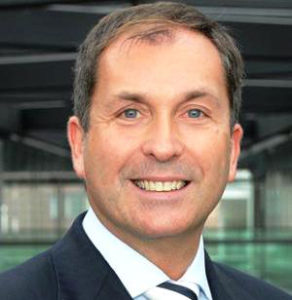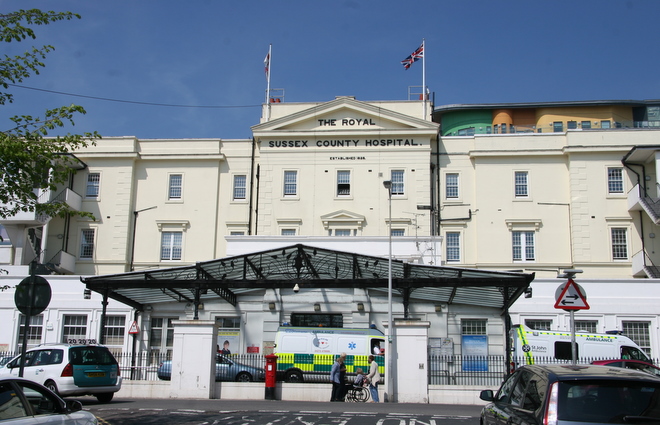Hospital bosses in Brighton have apologised unreservedly after a Care Quality Commission (CQC) report criticised services as inadequate today (Wednesday 17 August).
The CQC gave its worst rating to the Royal Sussex County Hospital and the trust that runs it, Brighton and Sussex University Hospitals NHS Trust.
This morning the trust said: “The Care Quality Commission (CQC) has published its report of the full inspection of the trust that was carried out in April.
“The inspectors looked at the trust’s ability to provide safe, effective, caring, responsive and well-led services and has given an overall rating of ‘inadequate’.
“The CQC has also recommended to NHS Improvement that the trust is put into ‘special measures’.
“This means the trust needs to demonstrate a thorough improvement plan is in place, will be closely monitored by regulators and will receive additional support that will enable the necessary improvements to take place.
“The CQC inspectors raised concerns about a number areas, including the inappropriate use of the ‘cohort’ area in A&E (accident and emergency) at the Royal Sussex County Hospital, the patient care environment within the trust’s oldest buildings and the failure to provide treatment and care that is in line with national timescales and standards.
“The CQC report has also highlighted several areas of excellent practice across the trust. Services for children and young people have been rated as ‘outstanding’, end of life care has been rated good in a number of areas and stroke services at the Royal Sussex County Hospital has been highly praised.
“The CQC inspectors said that overall staff were caring and compassionate to patients’ needs and patients and their relatives felt they received good care and were well looked after.
“Since the CQC’s inspection in April the trust has been working hard on delivering a plan designed to address the issues raised in the report and significant improvements have already been made.
“These include redesigning the assessment area in the Emergency Department at the Royal Sussex County Hospital to speed up the assessment of patients, changing processes to better manage emergency patients in periods of high demand and the opening of a 24/7 surgical assessment unit for patients referred by GPs.”
Gillian Fairfield, interim chief executive, said: “It is clear from the CQC report that in many areas the trust has failed our patients and, on behalf of the trust, I apologise unreservedly.
“The reasons for many of the failures highlighted by the inspectors are complex and wide ranging.

“The NHS as a whole is seeing growing demand for services and, like many other trusts across the country, this has caused us significant challenges which has affected the standard of the care we are providing our patients.
“These challenges have been made worse by the fact that our older buildings are not fit for purpose.
“The number of people being treated in our Emergency Departments has never been higher and our staff are absolutely committed to providing the best possible care but, despite their best efforts, some patients are having to wait longer than they should to be treated and discharged or admitted into hospital.
“The increase in emergency patients needing to be admitted to a hospital bed, coupled with the difficulty we are experiencing in discharging patients who no longer need acute hospital care, is impacting on the availability of beds for planned procedures and operations and the waiting times for these as well.
“It would be wrong for us to use these pressures and challenges as excuses, however, and we know we should and need to be doing better for our patients and staff.
“The failures identified by the CQC are completely unacceptable and over the last four months we have had, and we will continue to have, a relentless focus on addressing them.
“We have not waited for this report to start tackling the CQC’s issues and we took swift action following their inspection to address their immediate concerns to ensure our patients are getting direct care that is safe.
“For example, within 20 minutes of the CQC raising concerns around fire safety in the Barry Building, we started to make the necessary changes to make sure the patients in that area were in a safe environment.
“We have developed a comprehensive improvement plan and since I started at the trust in April we have been making significant progress in many areas.

“There is a lot more to do and some of the improvements will take time and a lot of hard work to achieve but we are determined to continue the improvement process we have started to get to a place where we are providing our patients a standard of care that they rightly expect and deserve.
“We are working to develop a culture of equality, fairness and accountability, with sustainable effective leadership, where patients are cared for in an appropriate environment.”
Antony Kildare, interim chairman of the trust board, said: “The report has clearly illustrated that as a trust we face a number of significant issues and the board is absolutely committed to making the improvements necessary to overcome them.
“We have made a number of recent changes at board level and we recognise that we have to do more to address our key challenges and help staff transform our services for our patients and local communities.
“Over the last four months since the CQC’s inspection, the trust has already made very good progress but this is just the start and we now need to carry on the momentum we have started.
“It is clear we cannot do this in isolation, we need the support of the entire health system outside the hospital, and we will continue to work closely with all our partners to develop and embed the necessary long-term changes that will make a real positive difference to the care of our patients.
“It is also important that we recognise that the CQC highlighted several examples of outstanding services and the inspectors said that overall staff were caring and compassionate to patients’ needs and patients and their relatives felt they received good care and were well looked after.
“Our aim now is to try to find ways of replicating this excellence across the whole organisation to ensure all our patients receive a similar high standard of care.”










